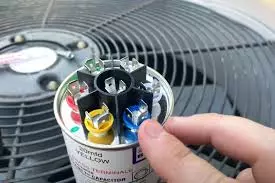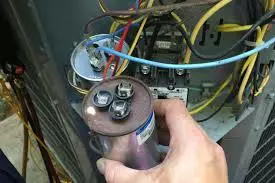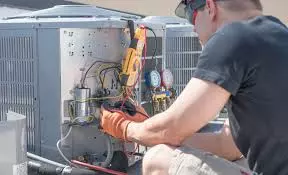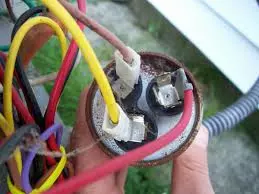Maintaining an air conditioner (AC) involves understanding various components and their functions. One critical component that often requires attention is the capacitor. This blog post will provide detailed insights into the role of capacitors in AC units, common issues, and how to address them.
Understanding the Capacitor in an Air Conditioner

What is a Capacitor for an AC Unit?
A capacitor for an AC unit is a small but crucial component that stores electrical energy and provides the necessary power to start and run the AC’s compressor and fan motors. It works by sending a jolt of electricity to these motors, helping them overcome initial resistance and continue running smoothly.
Types of Capacitors
There are two main types of capacitors in an air conditioning system:
- Start Capacitors: Provide a quick burst of energy to start the compressor.
- Run Capacitors: Supply a continuous flow of energy to keep the compressor and fan motors running.
Importance of the Capacitor
The capacitor air conditioner plays a vital role in the efficient functioning of your AC unit. Without a properly functioning capacitor, the motors may struggle to start or run efficiently, leading to increased energy consumption and potential damage to the system.
Common Issues with AC Capacitors

How to Tell if an AC Capacitor is Bad
Knowing how to tell if an AC capacitor is bad is essential for timely troubleshooting. Common signs of a failing capacitor include:
- AC unit not starting.
- Humming noise from the unit.
- AC unit turning off on its own.
- Delayed cooling.
- Visible bulging or leakage from the capacitor.
Testing the Capacitor
To confirm if the capacitor is faulty, you can use a multimeter to check its electrical charge. However, this task is best left to professionals due to the high voltage risk.
Life Expectancy of Air Conditioner Capacitors
The life expectancy of air conditioner capacitors typically ranges from 10 to 20 years, depending on various factors such as usage, environmental conditions, and maintenance. In places like Florida, where AC units run extensively, the lifespan may be shorter.
How Long Do AC Capacitors Last in Florida?
Due to the high demand on AC units in hot and humid climates, you might wonder how long do AC capacitors last in Florida. In such environments, capacitors often last between 5 to 10 years. Regular maintenance can help extend their lifespan.
Causes of Capacitor Failure
Capacitors can fail due to:
- Heat Exposure: Prolonged exposure to high temperatures can degrade the capacitor’s components.
- Electrical Surges: Power surges can cause sudden failure.
- Wear and Tear: Natural degradation over time due to regular use.
Replacing an AC Capacitor

When to Replace an AC Capacitor
Knowing when to replace an AC capacitor is crucial for maintaining your AC’s efficiency. If you notice any signs of a failing capacitor or your AC unit struggles to start, it might be time for a replacement.
Capacitor Replacement Cost
The capacitor replacement cost varies depending on the type and brand of the capacitor and labor costs. On average, you can expect to pay between $120 and $250 for a professional replacement, including parts and labor.
How to Replace an AC Capacitor
While replacing a capacitor might seem straightforward, it involves handling high-voltage components, which can be dangerous. Therefore, it is advisable to hire a professional HVAC technician for this task.
visit: REPAIRING SPLIT SYSTEMS WITH YOUR OWN HANDS
Steps for Replacement
If you choose to replace the capacitor yourself, follow these steps:
- Turn off the Power: Ensure the AC unit is completely powered off.
- Discharge the Capacitor: Use an insulated tool to discharge any remaining electrical charge.
- Remove the Old Capacitor: Disconnect the wires and remove the old capacitor.
- Install the New Capacitor: Connect the wires to the new capacitor, following the same configuration.
- Secure the Capacitor: Mount the new capacitor securely in place.
Maximizing the Lifespan of Your AC Capacitor
Regular Maintenance
Regular maintenance is key to extending the life of your AC capacitor. Schedule annual check-ups with a professional technician to ensure all components, including the capacitor, are in good condition.
Environmental Considerations
Keep your AC unit in a shaded area to protect it from excessive heat, and ensure proper ventilation around the unit to prevent overheating.
Monitoring Performance
Keep an eye on your AC unit’s performance. Any unusual noises, delays in starting, or inefficiencies should be addressed promptly to avoid further damage.
Conclusion
The capacitor air conditioner is a crucial component that ensures your AC unit runs efficiently and reliably. By understanding the role of capacitors, common issues, and the importance of regular maintenance, you can keep your air conditioning system in optimal condition. Whether you’re dealing with a failing capacitor or looking to replace one, it’s essential to prioritize safety and consider professional assistance to ensure the best results for your HVAC system.
